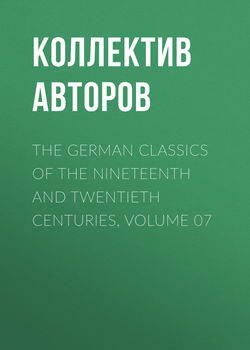Читать книгу The German Classics of the Nineteenth and Twentieth Centuries, Volume 07 - Коллектив авторов, Ю. Д. Земенков, Koostaja: Ajakiri New Scientist - Страница 10
GEORG WILHELM FRIEDRICH HEGEL
THE PHILOSOPHY OF LAW (1832)
THE CONSTITUTION
MEANING OF WAR
ОглавлениеThere is an ethical element in war. It must not be regarded as an absolute ill, or as merely an external calamity which is accidentally based upon the passions of despotic individuals or nations, upon acts of injustice, and, in general, upon what ought not to be. The recognition of the finite, such as property and life, as accidental, is necessary. This necessity is at first wont to appear under the form of a force of nature, for all things finite are mortal and transient. In the ethical order, in the State, however, nature is robbed of its force, and the necessity is exalted to a work of freedom, to an ethical law. The transient and negative nature of all things is transformed in the State into an expression of the ethical will. War, often painted by edifying speech as a state in which the vanity of temporal things is demonstrated, now becomes an element whereby the ideal character of the particular receives its right and reality. War has the deep meaning that by it the ethical health of the nations is preserved and their finite aims uprooted. And as the winds which sweep over the ocean prevent the decay that would result from its perpetual calm, so war protects the people from the corruption which an everlasting peace would bring upon it. History shows phases which illustrate how successful wars have checked internal unrest and have strengthened the entire stability of the State.
In peace, civic life becomes more extended, every sphere is hedged in and grows immobile, and at last all men stagnate, their particular nature becoming more and more hardened and ossified. Only in the unity of a body is health, and, where the organs become stiff, there is death. Eternal peace is often demanded as an ideal toward which mankind should move. Thus Kant proposed an alliance of princes, which should settle the controversies of States, and the Holy Alliance probably aspired to be an institution of this kind. The State, however, is individual, and in individuality negation is essentially contained. A number of States may constitute themselves into a family, but this confederation, as an individuality, must create an opposition and so beget an enemy. Not only do nations issue forth invigorated from their wars, but those nations torn by internal strife win peace at home as a result of war abroad. War indeed causes insecurity in property, but this real insecurity is only a necessary commotion. From the pulpits much is preached concerning the insecurity, vanity, and instability of temporal things, and yet every one, though he may be touched by his own words, thinks that he, at least, will manage to hold on to his possessions. Let the insecurity finally come, in the form of Hussars with glistening sabres, and show its earnest activity, and that touching edification which foresaw all this now turns upon the enemy with curses. In spite of this, wars will break out whenever necessity demands them; but the seeds spring up anew, and speech is silenced before the grave repetitions of history.
The military class is the class of universality. The defense of the State is its privilege, and its duty is to realize the ideality contained in it, which consists in self-sacrifice. There are different kinds of bravery. The courage of the animal, or the robber, the bravery which arises from a sense of honor, the chivalrous bravery, are not yet the true forms of it. In civilized nations true bravery consists in the readiness to give oneself wholly to the service of the State, so that the individual counts but as one among many. Not personal valor, but the important aspect of it, lies in self-subordination to the universal cause.
To risk one's life is indeed something more than mere fear of death, but this is only negative; only a positive character—an aim and content—gives meaning to bravery. Robbers and murderers in the pursuit of crime, adventurers in the search of their fanciful objects, etc., also possess courage, and do not fear death. The principle of the modern world—the power of thought and of the universal—has given to bravery a higher form; the higher form causes the expression of bravery to appear more mechanical. The brave deeds are not the deeds of any particular person, but those of the members of a whole. And, again, since hostility is directed, not against separate individuals, but against a hostile whole, personal valor appears as impersonal. This principle it is which has caused the invention of the gun; it is not a chance invention that has brought about the change of the mere personal form of bravery into the more abstract.
